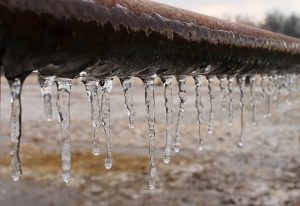Causes of Burst Pipes During the Winter & What to Do About Them
 Burst pipes are common during the winter months and cause stress, messes, and extensive water damage. Many people believe that this happens because the water freezes inside your pipes. In truth, this happens because of increased pressure. Since the water entering your home is colder in the winter months, it can cause the pipes to contract. This causes the pressure inside the pipe to increase, which eventually gets too much for the pipe to contain. This results in a burst pipe and water damage so many of us are familiar with.
Burst pipes are common during the winter months and cause stress, messes, and extensive water damage. Many people believe that this happens because the water freezes inside your pipes. In truth, this happens because of increased pressure. Since the water entering your home is colder in the winter months, it can cause the pipes to contract. This causes the pressure inside the pipe to increase, which eventually gets too much for the pipe to contain. This results in a burst pipe and water damage so many of us are familiar with.
Even small cracks can be devastating. According to the Institute of Business and Home Safety, a crack as small as an eighth of an inch (3 mm) can result in more than 250 gallons of water being leaked every day. This is more than enough water to destroy your possessions and cause extensive structural damage to your property. Fortunately, there are measures you can take to prevent water pipes from bursting and causing water damage. Knowing the causes of burst pipes and taking preventive measures can save you a great deal of worry, time, and money.
Causes of Burst Pipes During the Winter
While frozen pipes are the most common cause of burst pipes in the winter months, it’s not the only reason for pipes bursting. The following are some of the most common causes that you need to know to keep an eye out for them.
Frozen Pipes
This is the most common reason for pipes bursting in the winter. Like most objects, metal pipes contract in cold weather. On the other hand, the water inside them expands. This pressure built-up results in the pipe rupturing.
Shifting Ground and Corrosion
Earthquake-prone areas are especially prone to pipe damage due to force and weakening of the pipes. Those living in areas frequented by earthquakes should have their pipes regularly tested to prevent rupturing. Old and corroded pipes are also at risk of bursting.
Tree Roots
Tree roots spread towards the water and can grow into your pipes and damage them. This can weaken them and cause them to burst or make them more prone to rupture in the winter months.
Unsecured Pipes
Unsecured pipes can be dangerous since the sheer force of the water inside them can cause them to move around. While your pipes may be able to handle this temporarily, over time, this results in weak joints and sections of the pipe simply giving way to the pressure caused.
How to Prevent Burst Pipes
While you can’t eliminate the possibility of pipes bursting, there are certain steps you can take to minimize the likelihood of it happening. Do the following to prevent pipes from bursting and causing water damage to your property.
Keep Your Water Faucets Running
During the winter months, it’s a good idea to keep a couple of faucets running slowly since water moving through the system keeps the pressure low and can keep the line from freezing. This doesn’t mean wasting water by letting the water run through the faucets when you’re not using them. It can be as little as some dripping or a slight trickle.
Maintain Your Pipes
There is no replacement for regular pipe maintenance. You should always keep an eye on your pipes and routinely check them for any damage or signs of wear and tear. Replacing damaged pipes or fixing leaks can go a long way in preventing burst pipes. Additionally, pipes that are already cracked are more likely to burst at the slightest increase in pressure.
Keep Doors Open
Keeping the doors inside your home open lets the heat move through the house more efficiently. It also helps heat reach pipes and dramatically reduces the risk of them freezing and bursting.
Add Insulation
Using foam or heat tape to insulate your pipes can go a long way in preventing freezing and bursting. Those who live in warmer climates don’t pay heed to this, but it is especially important since they will be caught off guard if cold weather hits them. Insulation is readily available at home improvement stores and can be easily installed. Foam insulation and heat tape can be wrapped around the pipe to protect it from winter temperatures. You can also use thermostatically controlled heat cables for the same purpose.
911 Restoration of Glendale Can Help With Water Damage Restoration
If your pipes do end up bursting, all hope is not lost. Water damage can be devastating, but qualified and reputable home restoration services like 911 Restoration of Glendale can help you mitigate water damage and return your home to its pre-damage condition.
Whether or not your possessions are able to be salvaged depends on how quickly you act. Since mold can start to form within 24-48 hours, you must begin the water damage restoration process as soon as possible. Fortunately, 911 Restoration has experience in both water damage mitigation and mold testing and removal. Our IICRC-certified technicians are available 24/7 for emergencies.
If you require water damage restoration in Glendale or surrounding areas, you can call us at (623) 289-2700 or contact us here. We respond within 45 minutes and can help with all your commercial and home restoration needs.



